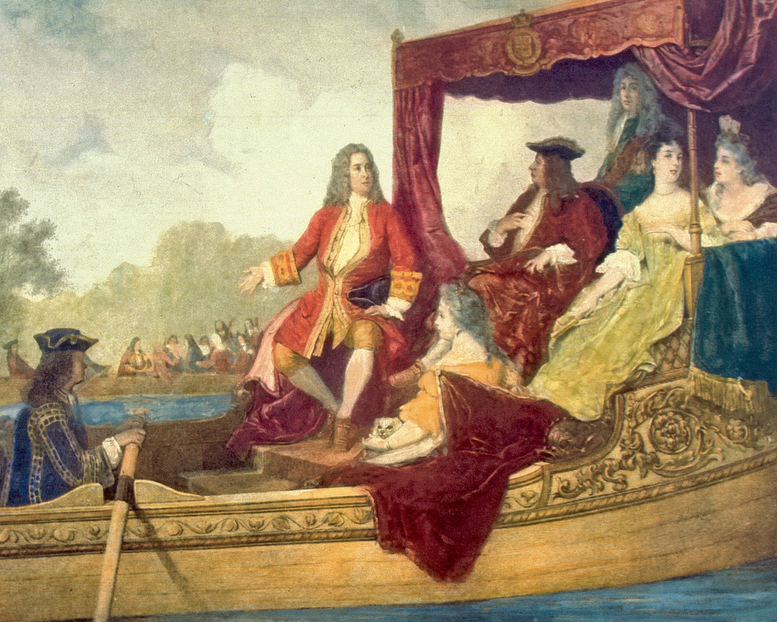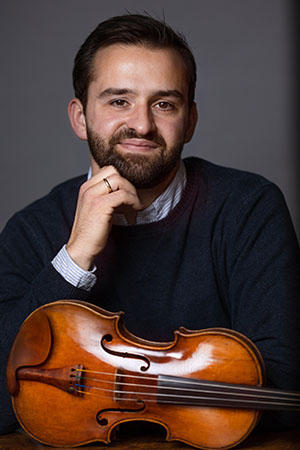by Daniel Hathaway
At 12:15 noon, organist Robert Myers plays “Going neo-Baroque” on the Beckerath organ in Trinity Lutheran Church in Ohio City, and at 2 pm, Ohio Light Opera stages Me And My Girl at the College of Wooster.
Three events are in the works at 7:30 tonight:
• the Cleveland Museum of Art’s City Stages presents Wesli (Canada/Haiti) at Transformer Station,
• the Kent/Blossom Festival features violinist William Hagen (pictured) with Stephen Tavani, violin, Afendi Yusuf, clarinet and friends from The Cleveland Orchestra performing Mozart’s Clarinet Quintet and Schubert’s Octet in Ludwig Recital Hall on the Kent State Campus,
• and Apollo’s Fire “Rediscovers” Vivaldi’s Four Seasons at Kirtland’s Holden Arboretum.
And at 8 pm, Classical Revolution rises anew at the Happy Dog on Detroit Ave., on Cleveland’s West Side.
For details of upcoming concerts, visit our Concert Listings page.
TODAY’S ALMANAC:

There are two contemporary accounts of the event:
London, 19 July 1717: Extract from a report to Berlin of the occasion written by Friedrich Bonet, the Prussian Resident in London:
A few weeks ago the King expressed to Baron Kilmanseck His desire to have a concert on the river, by subscription, similar to the masquerades this winter which the King never failed to attend…The necessary orders were given and the entertainment took place the day before yesterday. About eight in the evening, the King repaired to his barge…Next to the King’s barge was that of the musicians, about 50 in number, who played on all kinds of instruments, to wit trumpets, horns, hautboys, bassoons, German flutes, French flutes, violins and basses; but there were no singers. The music had been composed specially by the famous Handel, a native of Halle, and His Majesty’s principal Court Composer.
The Daily Courant reported on the event on July 19:
…a City Company’s barge was employ’d for the Musick, wherin were 50 Instruments of all sorts, who play’d all the Way from Lambeth (while the Barges drove with the Tide without Rowing, as far as Chelsea) the finest Symphonies, compos’d express for the Occasion, by Mr. Hendel [sic]; which His Majesty liked so well, that he caus’d it to be plaid over three times in going and returning. At Eleven his Majesty went a-shore at Chelsea, where Supper was prepar’d, and then there was another very fine Consort of Musick, which lasted till 2; after which, his Majesty cam again into his Barge, and return’d the same Way, the Musick continuing to play till he landed.
What we now know as Handel’s Water Music is one of several collections of individual pieces first gathered in 1733 into three suites by key: one with trumpets and drums in D, one with horns in F, and an “indoor” suite in G with recorders, flutes, and bassoon.
Many of us grew up with Sir Hamilton Harty’s 1920 lavish re-orchestration of the pieces for the Hallé Orchestra (he did the same for Handel’s Fireworks Music), a practice justified by Sir Thomas Beecham:
“The original Handelian orchestra was composed of a handful of strings and about a dozen reed wind instruments, mainly oboes and bassoons, with an occasional reinforcement of horns, trumpets, and drums, restricted by necessity to the somewhat monotonous repetition of tonic and dominant. This makes hard going for any audience asked to listen to it with the opulent sound of a latter-day orchestra well in its ears.”
Have fun comparing Harty’s treatment of the Water Music in a recording by the London Symphony under George Szell, with a live performance by the Akademie für alte Musik Berlin on period instruments.




